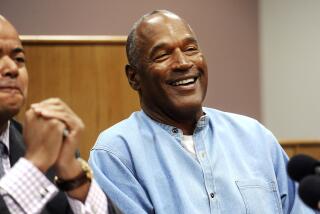Hertz exec hired O.J. Simpson
BOCA GRANDE, FLA. — Robert L. Stone, a former top executive at the Hertz Corp. who in the 1970s hired O.J. Simpson as a pitchman for the car rental giant, has died. He was 87.
Stone died Wednesday of heart failure at his home in Boca Grande, his wife, Sheila Muldowny Stone, said Saturday.
Stone became the chairman and chief executive of Hertz in 1972, when the company was a subsidiary of RCA Corp. It is now known as Hertz Global Holdings Inc.
It was Stone’s decision to hire football star Simpson as the spokesman for Hertz in a series of iconic television commercials, his wife said. At the time, Simpson was a national sports hero. The ads featured Simpson leaping over luggage inside airline terminals.
An avid sportsman himself, Stone wanted an athlete to represent Hertz, according to his wife.
“He was tired of watching commercials with actors who didn’t do anything but talk,” she said.
Simpson, she said, “was fabulous at that particular moment in time. He was a different O.J.”
Under Stone’s leadership at Hertz, the company’s revenue increased from $21 million in 1972 to $200 million by 1978.
Stone left Hertz in 1978 to become chief operating officer for Columbia Pictures. He retired in 1983 but continued to serve as a consultant. In 1980, Fortune magazine named him one of the 10 toughest bosses to work for.
Stone was born Dec. 12, 1921, in New York City.
He left Williams College to enlist in the Army Air Forces in 1942 and flew 40 combat missions in the Pacific as a bombardier. He received the Distinguished Flying Cross and the Air Medal.
Stone came to Hertz from NBC, where he had been general manager of the television network and president of its radio division. He previously worked as vice president and general manager of the ABC affiliate in New York City.
Stone’s first wife, Mary Elizabeth Lee, died in 1966. He is survived by his wife, four children and two stepchildren.
More to Read
Inside the business of entertainment
The Wide Shot brings you news, analysis and insights on everything from streaming wars to production — and what it all means for the future.
You may occasionally receive promotional content from the Los Angeles Times.










